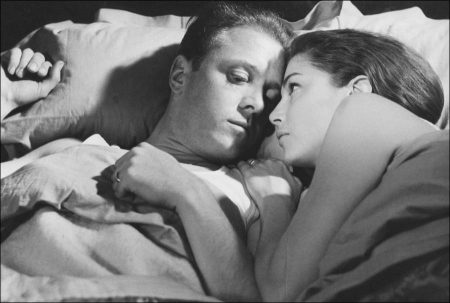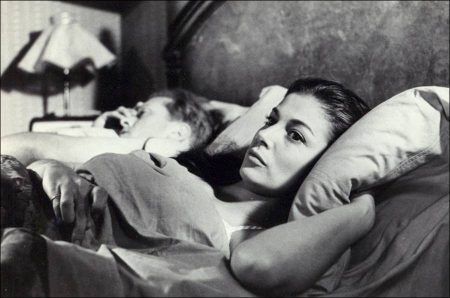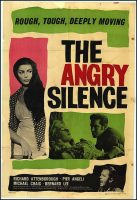The Angry Silence movie storyline. The right of every individual to be different from his fellow man is the theme behind this internationally-hailed, British production. The story tells of a man’s dilemma when he refused to participate in an unofficial strike, where he works. While vicious, calculated violence brings the other dissenters into line, he goes it alone and is sent to Coventry (given the silent treatment) by his fellow workers. A stirring, thought-provoking movie that portrays the human problems and high emotions generated when a man dares to act on the courage of his convictions, and dares fight to keep his individual freedom.
The Angry Silence is a 1960 black-and-white British drama film directed by Guy Green and starring Richard Attenborough, Pier Angeli, Michael Craig and Bernard Lee. The film marked the first release through screenwriter Bryan Forbes’s production venture, Beaver Films, and Forbes won a BAFTA Award and an Oscar nomination for his contribution (shared with original story writers Michael Craig and Richard Gregson).
About the Film
Richard Attenborough had been a memorably noxious capitalist in I’m All Right, Jack (1959), the Boulting Brothers’ plague-on-both-your-houses satire of labour relations; a year later, he found himself on the other side of the management/worker divide in this engrossing, if somewhat hysterical, account of workplace conflict.
Written and co-produced (with Attenborough) by Bryan Forbes as the first release of his production venture, Beaver Films, the film has more than a touch of On the Waterfront (US, 1954) about it, notably in the factory gates denouement. But the milieu is distinctly British, with the flavour of the emerging British New Wave, sharing its Northern industrial landscape with the likes of Karel Reisz’s Saturday Night and Sunday Morning, released later the same year.
The film’s evocation of turn-of-the-1960s working-class life remains its strongest suit, particularly in the scenes on the factory floor (which, as Sight and Sound’s Penelope Houston commented, “looks like a place where something might really get made”) and in the claustrophobic top-floor flat shared by Tom (Attenborough), his Italian wife Anna (Pier Angeli), their two kids and the lodger, the perpetually fence-sitting Joe (Michael Craig – also co-credited for the original story). Both Attenborough and Angeli bring real dignity to their roles, and their bewilderment in the face of Tom’s unfair treatment at the hands of his colleagues is affecting.
The film’s politics, however, are less convincing. The script tries hard to inject some balance, making clear that the industrial action lacks official union support, and demonstrating that the attitude of the factory manager Martindale (Laurence Naismith) is every bit as callous and unprincipled as that of shop steward Connolly (Bernard Lee). But Forbes chooses not to make the workers’ concerns clear – the only demand we hear is for more toilet roll – with the effect that we are unable to determine the justice of their grievances.
Similarly, we are left entirely in the dark about the deeper motivations of either Alfred Burke’s shady agent provocateur, Travers, or his unseen London cohorts. Most troubling is the film’s representation of Curtis’s fellow workers, who appear as little more than sheep, readily manipulated by the none-too-bright Connolly, who is in turn the puppet of the altogether shrewder Travers. The result is an unbalanced and ultimately unsatisfying film, though one which remains fascinating for the way it signals the growing anti-union paranoia of the following two decades.
The Angry Silence (1960)
Directed by: Guy Green
Starring: Richard Attenborough, Pier Angeli, Michael Craig, Bernard Lee, Alfred Burke, Geoffrey Keen, Stephen Lindo, Laurence Naismith, Russell Napier, Penelope Horner, Brian Bedford, Brian Murray
Screenplay by: Bryan Forbes, Michael Craig, Richard Gregson
Cinematography by: Arthur Ibbetson
Film Editing by: Anthony Harvey
Art Direction by: Ray Simm
Makeup Department: Harry Frampton, Barbara Ritchie
Music by: Malcolm Arnold
MPAA Rating: None.
Distributed by: British Lion Film Corporation
Release Date: March 15, 1960
Views: 148


